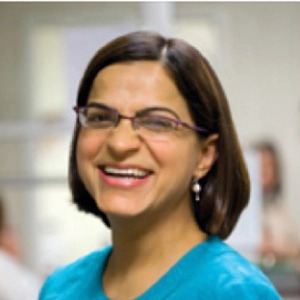Interview with Dr. Nidhi Mahendra of San Jose State University

Nidhi Mahendra is an Associate Professor of Communicative Disorders and Sciences, and the Director of the Spartan Aphasia Research Clinic (SPARC) at San Jose State University. She is a multilingual speech-language pathologist who specializes in adult neurogenic language disorders, specifically dementia and aphasia. She also has expertise in healthy aging, multicultural issues in service delivery, and in palliative care.
Note: You should consult with your doctor or speech pathologist for recommendations on treatment. The views and opinions expressed in this article are those of Dr. Mahendra and do not necessarily reflect the official policy or position of SpeechPathologyMastersPrograms.com
How did you become interested in researching aphasia?
When I was an undergraduate student in Speech and Hearing Sciences, I found the intersection between language and thought fascinating. I learned that language could break down without an intellectual impairment in aphasia. It was an immediate challenge to me how you would prove that a client with aphasia could communicate better than they could speak, and that their intelligence sparkled beneath the language disorder. I can still remember the first client I observed with aphasia and the lightbulb moment it was, for me, as a student.
What are some of the most important things we have learned about aphasia over the past couple of decades?
Great question. We have learned so much that it’s hard to pick just a few things. Here are my top 4 for students and clinicians:
a) There is no ceiling to recovery from aphasia – we have not given enough credit to the human brain’s capacity to continually rewire in response to sustained rehabilitation, stimulating experiences, and creative pursuits
b) People with aphasia are at great risk for social isolation and depression due to loss of their communication lifelines – they need a community that gets aphasia and recognizes the potential of people with aphasia
c) There is a robust science and evidence behind what to do in aphasia therapy and this needs to infiltrate our daily practice as clinicians.
d) People with aphasia and their families have a right to the same quality of life that you and I have. We have to better partner with our clients to design the right therapeutic environments that maximize their quality of life.
What are some of the challenges to getting those with aphasia the treatment they need?
Another great question! In my mind, the biggest challenge is that too many lay people and too many medical providers do not know what aphasia is, and how it affects a person. The next biggest thing is that speech-language pathologists (SLPs) are central to providing aphasia rehabilitation, yet there is a national shortage of SLPs, and a dramatic shortage in states like California (the most populated state of the nation). Further, even among practicing SLPs, not all are trained in contemporary frameworks of aphasia therapy, such the Life Participation Approach to Aphasia (LPAA). Finally, there are startling misperceptions among many medical providers and third-party payers of therapy services, regarding how long after a stroke a person would benefit from therapy and how long they should continue to receive services. Together, these challenges really limit the recovery of persons with aphasia.
You have also researched student perception of aphasia treatment- what have you learned here?
Yes I have. I believe that the future of learning is to co-create content and learning experiences, with our learners. To this end, I am always curious about what learning experiences in the classroom and clinic serve as “aha” moments for students and stir up their passion and excitement for what we can do for our clients with communication disorders. I have found from my work in dementia and aphasia, that students consistently derive great enjoyment from and learn an astonishing amount from narrative accounts of patient experience, and real-time interactions with persons with aphasia and their families.
How do you choose new research to pursue at the Spartan Aphasia Research Clinic?
It’s based on a combination of things happening in the fields of speech-language pathology or aphasiology, and the opportunity we might have locally and regionally (via funding, collaborations), while identifying priorities we decide on with our clients with aphasia.
What aspect of your work are you most proud of?
I have to say I am most proud of the people I have had a positive impact on – certainly persons with aphasia and their families but also our students and future SLPs. In the end, our students will go out and change the face of the discipline and I find that there is an incredible return-on-investment if we do things right in training our students.
What advice do you have for those starting a master’s in speech pathology program?
I could fill a book on this topic! My main advice would be to try and savor what a privilege it is to go to graduate school and to enter this amazing, rewarding profession. Keep this gratitude at the front of your mind and cultivate a calmness and a methodical mindset for problem-solving. Remember that the most important things in life are very hard work and an opportunity to develop transformative knowledge, skills, and mindsets for a lifetime. Graduate school is no different – it is meant to challenge you, to push you, and for you to discover who you are going to be, as a professional. My heartfelt advice is to surround yourself with positive-thinking peers and spend your time becoming the best student and clinician you can be.
Sponsored online speech pathology programs

Online MS: Pursue SLP Certification. Study FT/PT
Speech@Emerson enables you to earn an MS online and pursue SLP certification in as few as 20 mos. Learn the same curriculum as the on-campus program. Study FT or PT.
- Prepares you to pursue certification as an SLP generalist
- In-person clinical placements at faculty-approved partner sites
- As few as 20 months to complete
AD

Want to Become an SLP? Earn an MS Online at NYU
NYU Steinhardt’s online master of science program in Communicative Sciences and Disorders prepares aspiring speech-language pathologists with a comprehensive professional education.
- Prepares students to pursue SLP licensure
- Accredited by ASHA’s Council on Academic Accreditation
- As few as six terms to complete
- Full-time and part-time plans of study
AD

Online MS in Speech-Language Pathology from Pepperdine University
Pepperdine University’s online Master of Science in Speech-Language Pathology program combines a robust, innovative curriculum rooted in Christian values with a full-time or part-time option that features online learning, on-campus intensive experiences, and comprehensive clinical field practicums to prepare skilled, compassionate students for careers as speech-language pathologists.
- Full-time (five trimesters) or part-time (eight trimesters) options available.
- No GRE scores required.
- 400+ supervised, clinical learning hours are done at schools/clinics local to students
- Three onsite experiences build a sense of camaraderie and community throughout the program
AD

